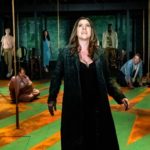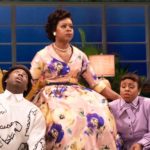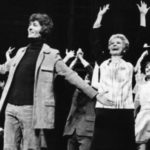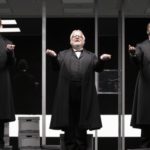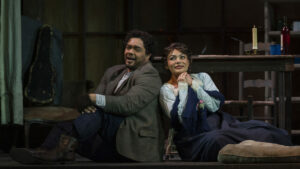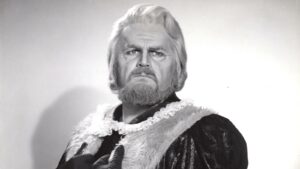
David Fox
Non-observant Jew that I am, my recent immersion into not one by two new plays—Pictures from Home on Broadway, and The Wanderers at the Roundabout—that very much live in that world was something of a double-whammy.
Updating opera settings is, of course, expected; I’d wager in most houses more often than not it’s now the norm. Still, few in my experience have the specificity and local immediacy of Don Pasquale at the Academy of Vocal Arts.
Soprano Lydia Grindatto confirmed the fine impression she had made at Giargiari vocal competition with a charismatic, thoroughly inhabited performance that showed careful preparation in every aspect.
This is likely the best Giargiari Bel Canto competition year in my experience, evidenced in several important ways.
Rodrigo is a ball-breaking role, but Lawrence Brownlee makes the demands sound easy—tossing in additional high notes and audaciously decorating cabalettas as if it were the easiest thing in the world.
Festival O is back, and the sense of joy and expectation was palpable among the audience and Opera Philadelphia staff, who chatted together as we awaited the start of The Raven.
Philadelphia’s memorably if quirkily named Idiopathic Ridiculopathy Consortium deserves to be better known.
No uneasy stock market or rickety roller coaster has generated more stomach-churning highs and lows than the musical Dear Evan Hansen.
An elegantly streamlined production of Into the Woods now on stage at Philadelphia’s Arden Theatre makes the best case for the show I’ve yet seen
“We came through the Depression by the skin of our teeth! One more tight squeeze like that and where will we be?”
With no disrespect to Nadine Sierra, who as Lucia acquits herself honorably if not magically in vocal terms, the undisputed cause célèbre here is director Simon Stone.
Dramaturgically, The Hours is a mixed bag: I wouldn’t discard it, but I would want to fix it. But simply as an evening of gorgeous music and singing, it’s cordon bleu.
Ana Maria Martinez is an artist of the first caliber, which was richly evident throughout this imaginative, substantial (nearly two hours!) program, which was (thank you!) offered without a music stand.
As we continue to watch the world of live performance come cautiously back to post-COVID levels, I felt the greatest surge of joy so far when I saw Opera Philadelphia’s announcement of their 2022-23 season—and most especially, the reboot of Festival O.
There was something very Russian—indeed, Chekhovian—about the mix of joy and tears, as the Academy of Vocal Arts performed Tchaikovsky’s Eugene Onegin
So that there’s no confusion: the Long Day’s Journey into Night seen here is contemporary, political, brutal, and universal.
Opera Philadelphia’s return to the stage after two years was greeted by a cheering crowd who clearly would have been happy to stay longer, but as director David Devan acknowledged, this was a step in a continuing trajectory.
When I think of Stephen Sondheim, so many of my memories are not simply about shows of his I loved and learned from—they are experiences that literally shaped my life.
The Lehman Trilogy had me in its thrall from the moment the lights went up. It’s absolutely spellbinding. That’s not to say I endorse it wholeheartedly, though.
Call me Mary Quite Contrary if you want, but as we finally see live performances coming back, I’m reflecting with gratitude and even some nostalgia on the way COVID quarantine forged a path for entrepreneurial performance companies to recalibrate and deliver their work through streaming platforms.
Faith. The title of this fourth and final chapter of Adam Guettel’s Myths and Hymns made me pause for reflection.
April is the cruelest month, the song tells us—but this year, it was a week later. Ghenady Meirson, Philadelphia’s master of Russian Opera and coach extraordinaire, died on May 8.



















